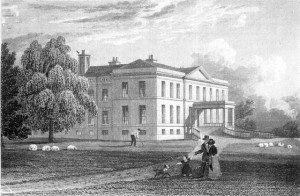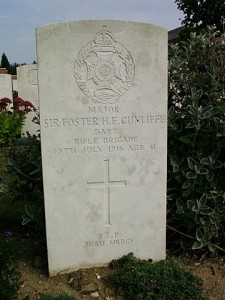The Somme Remembered – 10th July 1916
War does not care what race, creed or colour you are. Or, whether you are the son of a miner from small mining community, living in a 2 up and 2 down. Or, the son of a Knight of the Realm, having access to more than one home. In one of my other blogs I have remembered Prince Maurice Victor, grandson of Queen Victoria who was killed in action in 1915 – showing that War makes all men equal.
Within this blog, 31 days, 31 casualties – The Somme Remembered, I have tried to include men from all walks of life, from various parts of the country and from a cross-section of regiments. Today’s soldier comes from a privileged background!

Acton Park via Friends of Acton Park
Foster Hugh Egerton Cunliffe was born on 17th August 1875, the son of Sir Robert Alfred Cunliffe, 5th Bt. and Eleanor Sophia nee Leigh (married in Congleton Reg. Dist. Sept 1/4 1869).
Foster and his family were living at 37 Loundes Street, London in 1881. Robert was described his occupation as Bart., M.P., J.P., Dep. Lieut. Lt. Col. Militia, and his place of birth as India. At that time Foster was one of two children to Robert and Eleanor.
Foster attended Eton College followed by Oxford, being proficient at cricket, crichinfo Wisdens Cricketers’ Almanack reads:
‘………As a batsman he had a fine, free style, and h excelled as a left-handed medium-pace bowler, having a good lenght and sending down a difficult ball that came with his arm. He was in the Eton XI in 1893 and 1894, and in his four Public School matches obtained 35 wickets for 10.17 runs each; he took 11.74 v. Winchester in 1893 and 13 for p4 v. Harrow in 1894. At Oxford he obtained his Blue as a Freshman and in 1898, his last year in the XI, he was captain. In his four games against Cambridge he scored 99 runs in five completed innings and took 26 wickets for 22.88 runs each. Against Surrey, at Oxford in 1896, he obtained eight wickets in an innings for 26 runs. In 1897, when he began to appear for Middlesex, he was chosen for the Gentleman at Lord’s, and took three wickets in each innings of the Players. In 1895, he became a member of M.C.C., serving on the committee from 1903 until 1906. He was a Fellow of All Soul’s, Oxford, and a distinguished military historian.
He graduated from New College, Oxford with a M.A., and lectured on Military History at Oxford University. Foster wrote a book entitled ‘The History of the Boer War, which has been digitised.
By the 1901 census, we know that Foster has graduated from Oxford and living with quite a few, mainly single men and a female servants at **************, Bethnal Green. He is 25 years and ‘living on his own means’. The head of the household is Bernard R Wilson, a Clerk in Holy Orders.
Ten years later Foster is one of six living in a 16 roomed house – he is the first listed on the page and classes himself as a boarder, along with Carlisle James Scott Spedding, 58, living on Private MeTans; Francis Dyson Yeatman, 21, visitor and an Undergraduate at Cambridge along with servants – John Beeton Whitcheal, 41, Butler, Clara, his wife and the house cook, and their nine year old son, John Dawson Whitcheal. The entry for Foster seems to be in a different hand to the other entries, even so it is Mr Spedding that signs the document and more than likely completes the entries for himself and the rest of the household at 78 Oxford Terrace, London W.
In the Electoral Registers for 1915 have both Foster and Carlisle James Scott Spedding still living in rooms at 78 Oxford Terrace – Foster has the ‘back room second floor, furnished’, while Carlisle has the ‘Front room third floor furnished. Mr N Middleton of the same address is given as the Landlord or the person to whom the rent was paid. While Sir Foster Cunliffe, Bart., lived at no. 78, his friends and family could have telephoned him on Paddington 6397.
1914 came and war was declared and by July of 1915 Foster was in France, serving as a Major in the 13th Btn. Rifle Brigade. His medal card, as well as, informing about the medals awarded to Foster and their references, there are details of his Nominal Roll and on the reverse side are details of his brother – Sir Neville Cunliffe Bt., 25 St James Court, Buckingham Gate, SW1.
Major, Sir Foster Hugh Egerton Cunliffe was Killed in Action on this day 100 years ago and rests in Bapaume Post Military Cemetery, Albert with 409 other casualties, but of those only 229 are identified. He is also remembered in the cloisters of Eton College, where a rectangular tablet with indented corners has the following memorial in gold lettering ‘ In memorial F H E Cunliffe Baronetti Sexti de Acton viri amicis percari perjucundi qui apud Etonam et Oxoniam pilae artibus insignis in scholis annalium rei militaris diligens disipulus et doctor sociis coll anim adscriptus postea imles factus fideliter pro patria mortem oppetit XIII Die Julii MDCCCCXVI’
The Probate entry for Foster reads:
Cunliffe sir Foster Hugh Egerton of Acton Park Denbighshire baronet major 13th battalion Rifle Brigade died 10 July 1916 in France in action Probate London 6 February to the honourable Charles Henry Lyell major R.G.A. Henry Bucknall Betterton and Noel Middleton barristers-at-law and dame Cecile Victoria Cunliffe widow. Effects £135883 7s 1d’.
The Register of Soldiers’ Effects tells that over £120 was due to Foster, this would have more than likely been included in the Probate money paid to Charles, Henry, Noel and Cecile.
Fosters service records are available to purchase from the National Archives at Kew.
